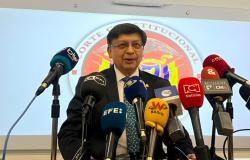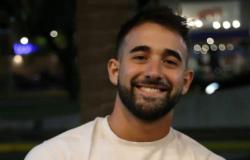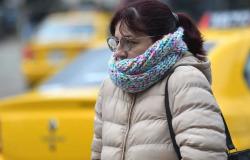
Until Thursday May 30 was all laughter and cordiality at the National Prosecutor’s Office, when the prosecutors sent by the Attorney General of Venezuela, Tarek William Saab, participated in a meeting with the director of the International Cooperation and Extraditions Unit (UCIEX) of the National Prosecutor’s Office of Chile, Juan Pablo Glasinovic.
Collaboration was agreed, There was a required photo and a “we are in contact”, even after the national prosecutor, Ángel Valencia, slammed the door on the Venezuelan prosecutors in their attempts to share confidential information from the investigation into the kidnapping and homicide of Lieutenant (R) Ronald Ojeda.
Well then. That cordiality did not last even a week, when during the day of this Wednesday, June 5, the attorney general of Venezuela launched a real missile towards the Chilean authoritiesbreaking all types of protocol and diplomatic formality.
“We consider that the Ojeda’s murder is a false flag operation. An operation that had the objective of clouding relations between Chile and Venezuela, just when a very important rapprochement was taking place. “What a coincidence,” he stated at a press conference, assuring that in this alleged operation “Chilean intelligence bodies and foreigners with spurious interests may have participated.”
Along these lines, he stated that “Indeed the motive is political, but it is not the one that has been being considered in the Chilean media and that the Chilean prosecutor’s office has not wanted to deny or corroborate.”
“We know that There are people involved in all stages of the incident who have not been able to be identified. and that they may belong to intelligence organizations of third countries,” said the prosecutor.
Williams was also referring to the request for collaboration from the Prosecutor’s Office, as well as from the Chilean government, to extradite, if arrested, two of the crime suspects.
It is presumed that Walter Rodríguez and Michael Villegas, two of those accused of being responsible for the crime, of Venezuelan nationality, escaped to their country of origin after the homicide. That is why Chile requested support from the government of Caracas for its location.. Prosecutor Héctor Barros, coordinator in the Metropolitan Region of the Organized Crime and Homicide Team (ECOH) of the Public Ministry, maintained that the crime “was organized from Venezuela.”
He Venezuelan Public Ministry provided information: it delivered Ojeda’s background files, as well as Rodríguez and Villegas, but nothing more. No clues about the location of the suspects reached national territory, much less indications of a possible extradition. That was never talked about before and, apparently, it never will be talked about.
This follows from the statement from prosecutor Williams, who assured that “if they were detained in Venezuela, will be judged here based on the evidence collected by the Chilean Prosecutor’s Office; who didn’t deliver anything.”
The latter is as the Venezuelan prosecutor pointed out: neither Prosecutor Valencia nor Prosecutor Barros shared information about the case with the foreign investigators, basically because the investigation is confidential. Even in a hearing held on June 4 in the Third Guarantee Court of Santiago, the secrecy was renewed for 90 more days.
The plaintiff attorney for part of the Ojeda family, Juan Carlos Manríquez, referred to the questioning of prosecutor Williams to the national investigation and maintained that “from the background that we know of the investigation that remains confidential, we do not have any precedent that says that this is an intelligence operation plotted in Chile or by third agencies. It is a statement that we regret that, on the one hand, they maintain that they must continue collaborating, but on the other, they claim that Chile does not want to hand over the information.”
In the afternoon, the chancellor Alberto van Klaveren referred to the statements made by the Attorney General of Venezuela, Tarek William Saab, which he described as “unacceptable” and “incomprehensible.”
“The statements of the Venezuelan attorney general “They are unacceptable, but they do not surprise us,” said Van Klaveren. And he added that “these statements are incomprehensible, since the fundamental thing is to know what news the Venezuelan authorities have about the two citizens of that country who are fugitives from Chilean justice. “That is the collaboration we are demanding and it is the minimum we can demand of them.”
In respect of Venezuela’s refusal to extradite the suspects in the Ojeda crime, In order to try them in the Chilean courts, the chancellor indicated that “the limitation regarding extradition is not new, but there is another established mechanism that would allow these criminals to be tried in Chile.”
However, the Secretary of State highlighted that “the central thing at this moment is that these criminals, who, as the (national prosecutor, Ángel) Valencia said, are in Venezuelan territory, are detained. With that we can begin to agree on courses of action.”
Likewise, the head of the Chilean diplomacy assured that the government does not intend to break diplomatic relations with Venezuela, but, on the contrary, obtain collaboration from their authorities. “It is not our policy to favor the breaking of diplomatic relations; What interests us is obtaining collaboration, which would be more difficult if we do not have representation in Venezuela,” he highlighted.
However, he stressed that “diplomatic courses of action are always under evaluation and we will exhaust all avenues to clarify this horrible crime.”
The Minister of Justice, Luis Cordero, also referred to the issue, who, in an interview with 24 Horas, pointed out that “in Chile we are respectful of the institutions, we are respectful of the autonomy of the Public Ministry and the independence of the Judiciary. In Chile there is no speculation about judicial cases. What corresponds is for the institutions to act and those of us who participate in the public debate only have an opinion once the information is publicly provided after the result of an investigation. “This is a country that respects its institutions and is not used to judicial speculation.”
Cordero also questioned the visit of Venezuelan prosecutors to Chile to learn about the case that remains confidential, regarding the fact that Tarek William Saab criticized the National Prosecutor’s Office for denying them access to the folder. “Collaborations in criminal investigations in the world, in Latin America, in Ibero-American countries, are regulated. They have institutional channels through which they are carried out. And they are not formulated through tourist visits,” he said.
Then, the head of Justice closed by saying that “informal relationships for investigation purposes are not appropriate. This is expressly regulated. The State of Chile, the Public Ministry, has requested it through the corresponding instance, which is the Chancellery. Informal relationships in criminal investigations do not exist. That is why institutional collaborations exist.”b
The national prosecutor, Ángel Valencia, who was in Congress when the statements of his Venezuelan counterpart occurred, assured that “he learned from the press” of this hypothesis and maintained that “I would only like to point out that carrying out an investigation in Venezuela for facts that had occurred in Chile, is a matter that is properly within the competence of the Venezuelan authorities, it is not a matter of Chilean competence.”
Along with this, he added: “What we hope, as on other occasions, is that if the Attorney General’s Office of Venezuela has been able to gather information that allows us to clarify these events that have occurred in Chile, through formal channels, these be sent for the purposes of being able to enrich the research that we have been carrying out in our country.”





